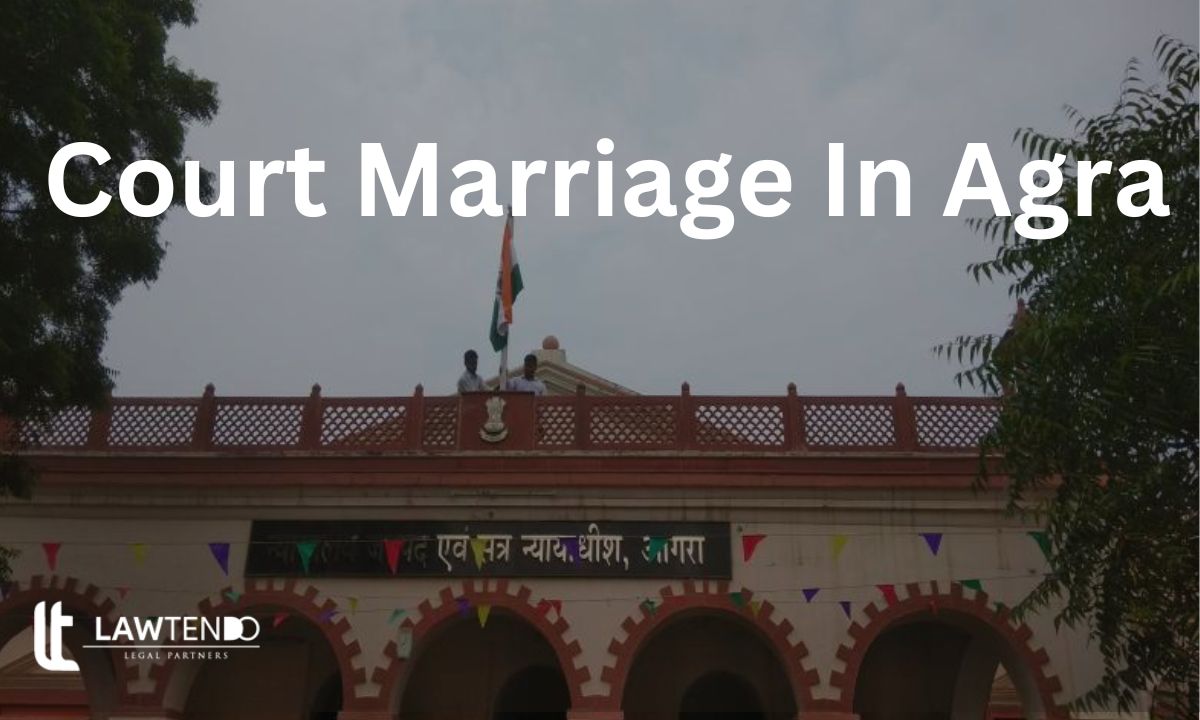Court Marriage in Agra

Date : 05 Dec, 2023
Post By admin
Court marriage in Agra stands as a testament to the democratic essence of love and union. This legal process, governed by various laws such as the Special Marriage Act, Hindu Marriage Act, Anand Marriage Act, Indian Christian Marriage & Divorce Act, facilitates the union of partners, transcending religious and caste boundaries. In the vast tapestry of Agra's legal framework, court marriage emerges as a distinct thread, contrasting sharply with traditional marriages, where rituals and ceremonies take center stage.
Legal Expertise: The Crucial Role of Matrimonial Lawyers
Embarking on the journey of court marriage necessitates the guidance of a skilled matrimonial lawyer. These legal experts at Lawtendo navigate the intricate legal landscape to ensure a seamless and stress-free court marriage experience. From paperwork to document organization, a lawyer is an indispensable ally in the pursuit of a legally recognized union. The expertise of these professionals becomes crucial in ensuring that all legal requirements are met, providing couples with peace of mind as they embark on this significant journey.
Essential Documentation for Court Marriage in Agra
To facilitate a court marriage, specific documents are required for both partners and witnesses. Here is a comprehensive list of the necessary documentation:
Documents for Male and Female Partners:
Identity Proof / ID Proof:
Choose any one of the following:
- PAN Card
- Driving License
- Passport
Address Proof:
Select any one from the following options:
- Aadhar Card
- Rent Agreement
- Voter ID Card
- Gas Bill
- Electricity Bill
Birth Proof:
Provide either:
- Class 10 Marksheet
- Birth Certificate (जन्म प्रमाण पत्र)
Divorce Decree:
If either partner has undergone a previous divorce, the divorce decree must be submitted as part of the marriage documentation.
Death Certificate:
Applicable if one of the partners has been widowed. The surviving partner must furnish the death certificate of the deceased spouse.
Photos:
Both male and female partners need to provide 6 passport-sized photos each.
Documents for Witnesses:
Identity Proof (ID Proof):
Choose any one of the following:
- PAN Card
- Driving License
- Passport
Address Proof:
Select any one from the following options:
- Aadhar Card
- Rent Agreement
- Voter ID Card
- Gas Bill
- Electricity Bill
Photos:
Every witness is required to submit 2 photos as part of the court marriage documentation.
Ensuring that these documents are complete and in order is crucial for a smooth court marriage process. It is advisable for both partners and witnesses to have all the necessary paperwork ready well in advance to avoid any delays or complications in the legal proceedings.
The Administrative Formalities: Notifying the Marriage Registrar
Initiating the court marriage process involves sending a marriage application to the district's marriage officer. The district is selected based on the criterion that at least one partner has been a resident for more than 30 days. This application, signed by both partners, serves as the first formal step towards court marriage. With the assistance of a dedicated lawyer, filling out the marriage application and dispatching it to the marriage registrar's office becomes a streamlined process. It's crucial to understand the nuances of this administrative formality, as any oversight could lead to delays or complications in the court marriage proceedings.
Transparency and Legal Scrutiny: Displaying the Notice of Intended Marriage
According to Section 6 of the Special Marriage Act, 1954, the marriage officer displays the notice of the intended marriage for 30 days. This public notice, prominently exhibited in the marriage office, adheres to legal procedures and fosters transparency in the court marriage process. This period serves as a crucial window for any objections to be raised. Understanding the significance of this step is essential, as it underscores the commitment to transparency in the legal proceedings.
Addressing Concerns: Objections to the Marriage
Section 7 of the Special Marriage Act, 1954, empowers individuals to voice objections directly to the marriage officer. In instances of objections, the marriage officer conducts an investigation and holds the authority to intervene if necessary. This ensures a thorough consideration of legal and societal aspects before proceeding with the court marriage. Delving deeper into this aspect, it's important to recognize the rights and responsibilities of individuals involved in the court marriage process and how objections are handled to maintain the integrity of the legal union.
The Essence of Simplicity: Completion of Court Marriage
Devoid of elaborate customs and rituals, court marriages involve the signing of a declaration form of marriage by both partners. In the presence of the marriage registrar and three witnesses, the union attains legal sanctity. This minimalist approach distinguishes court marriage, highlighting its efficiency and straightforwardness. Elaborating on this aspect provides a deeper insight into the unique nature of court marriages and their divergence from traditional ceremonies.
Seeking Clarity? Contact Our Experts at Lawtendo
For further clarifications and expert guidance on court marriage in Agra, reach out to our legal experts at Lawtendo. We are committed to ensuring a smooth and legally sound court marriage experience for every union seeking the sanctity of the law. Understanding the intricacies of court marriage and the important role of legal experts in the process is crucial for couples embarking on this journey.





